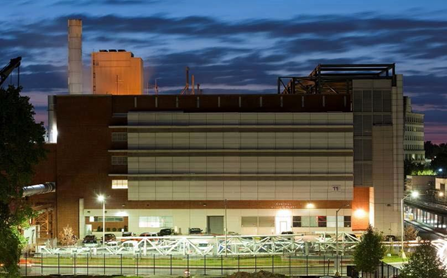Page Content

NIH Central Utility Plant (CUP)
Central Utility Plant houses five traditional gas- and oil-fired boilers that produce steam. Steam is needed for a myriad of NIH campus operations. These include space conditioning, hot water heating, medical equipment sterilization, autoclaves, animal cage and rack washing, dishwashing, and other process uses. The CUP generates and distributes ~ 1.2 billion pounds of steam per year to the NIH Bethesda campus buildings. The amount of electrical power the chiller plant consumed is 36 MW—enough to cool 30,000 single-family homes. There are over 300 manholes located around the campus that allow inspections and maintenance of the underground utilities. The electric cost to run just one chiller for one day is $8,300; to run all 12 for one day (required during the hottest summer days) is almost $100,000.
The plant distributes utilities to NIH's buildings underground via
- 2 miles of walkable tunnels
- 2 miles of concrete trench
- Natural gas lines totaling ~ 3.6 miles in length
- Domestic water lines totaling ~ 12 miles in length
- Steam and chilled water pipe lines totaling over 7 miles
Boiler Plant
The NIH Boiler Plant, part of the Central Utility Plant (CUP), houses five gas-fired boilers. Each year, the plant burns about 3 billion standard cubic feet of natural gas to generate about 1.8 billion pounds of steam for the buildings and facilities of the NIH Bethesda Campus. When necessary, the boilers can also be run on No. 2 fuel oil.
Chiller Plant
The CUP's twelve chillers consume about 165,000 megawatt hours (MWh) of electricity per year, roughly equivalent to the electrical energy required to air condition 100,000 Maryland households for a year. The total energy use (fuel and electricity) at NIH is equivalent to the energy used by 50,000 average Maryland homes